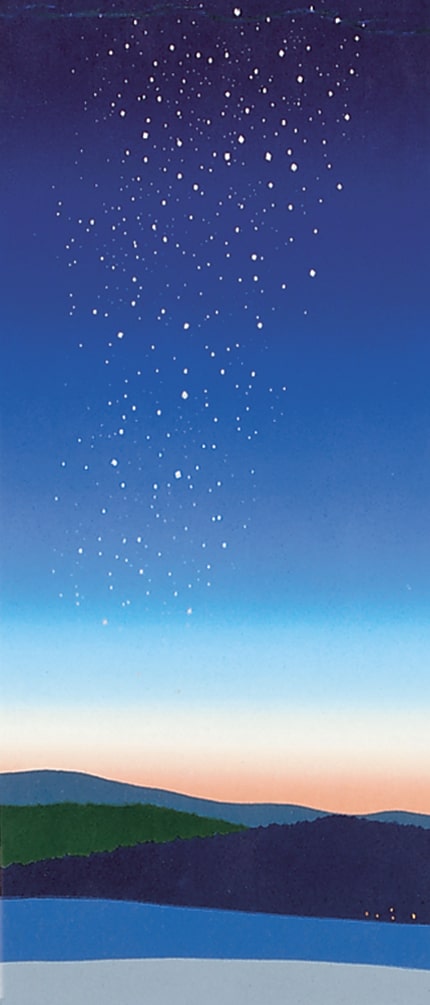
Night Sky | Mary’s Farm
Photo Credit : Copyright Sabra Field
Photo Credit : Copyright Sabra Field
The view of the night sky up here on the hill is so spectacular that two of my neighbors have taken note of it in naming their places. One is called Skyfield, the other Sky Hill. It took living here to understand the effect that a clear night sky can have.
An old friend came to visit me soon after I had moved here. He is a seer, a practicing reader of the stars, and he was eager to see this wide view of the heavens that I had told him about. His visit fell on the night of the new moon, the darkest night of the month, the brightest night for the stars. When darkness had fallen completely, we walked out to the rise in the hill, the highest point here, and stood in the black stillness. As our eyes adjusted, we heard only the quiet of the night, a quiet so complete that it seemed to reverberate around us. Overhead arched the great sparkling dome of the universe. Philip knew all the celestial configurations, and he patiently pointed out each one. Even though I could not always follow the careful lines his finger drew, he slowly located each member of our night family. Orion. Perseus. Venus. After he had found all his old friends, we stood in silence for a long time, heads thrown back, oblivious to the cold. We had begun to travel into that timeless and mysterious place beyond our immediate world, that place that leaves us slightly in awe of our smallness.
In his letters written home during World War II, my father used the night sky as a touchstone, the one thing he kept in common with the woman he hoped to marry. In the night sky, my father found a place that banished climate and seasons, language and time zones, war and hate. Looking up from his tent pitched on a dark hill in North Africa, he watched the stars and the moon, and then, the next morning, he wrote to my mother, half a world away, “I saw our moon last night and knew that you would soon see it, too. I feel closer to you, for that moon.”
The night sky, with all its sparkling constellations, is indeed the one unchanging aspect of our planet, the only territory we share with other nations. I remember the first time I discovered the beauty of the night sky on this hill, the first time I realized why my neighbors had named their places with reverence to the sky. When I first moved here, there was an unending array of problems to be dealt with: broken pipes, a faltering foundation, insufficient heat, an overwhelming amount of debris from a devastating ice storm, a barn that had begun to collapse. The list was long, my resources were short. I lay awake many nights.
One night these difficulties pressed in to an almost unbearable degree. It was a very dark night in January, and I was very cold, staying deep under the covers. I turned this way and that, but sleep would not come. At last I got up and walked down the hall. One of the windows in the bathroom had a broken pane. I went over to it and, with a towel, tried to stem the flow of cold air. But my attention was instead drawn outside, way outside, up into the darkness where the stars virtually burned toward earth. The beauty was so startling, I remember saying, “Oh!” out loud, into the silence of that difficult night. The stars shimmered in their places, each one distinct, each one representing an eternity of its own. I knew at once why I was here.
Whether from a tent in Africa during a world war or from a cold farmhouse on a New Hampshire hill at the teetering end of the 20th century, we need these celestial guides to keep us from despair. The stars tell us other things, too, but maybe the most important thing that they tell us is how close we really are to each other.
A slightly longer version of this essay was first published in Yankee’s January 2000 issue. Edie Clark’s books are available at edieclark.com.


